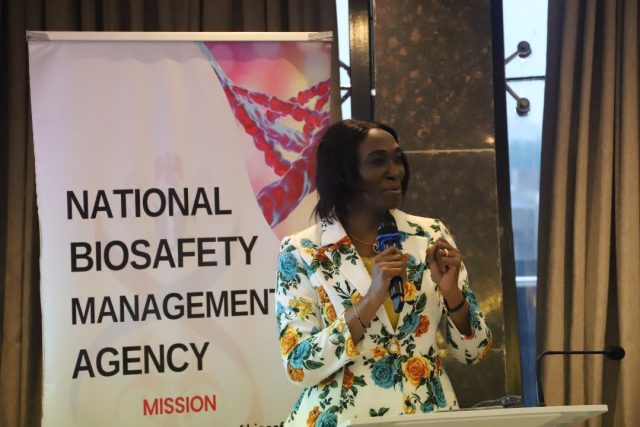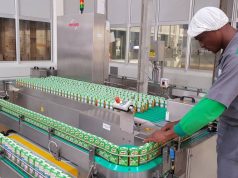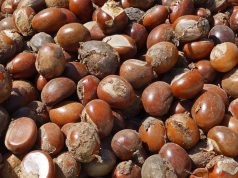The National Biosafety Management Agency (NBMA) has reaffirmed its dedication to ensuring the safe utilisation of Genetically Modified Organisms (GMOs) in Nigeria.
This is against the backdrop of ongoing criticisms regarding the commercialisation of various GM species in recent years.
In a statement released on Monday, Gloria Ogbaki, the Head of Information and Public Relations at the NBMA, emphasised that all GM products in Nigeria undergo a rigorous, science-based approval process conducted by the agency’s strict, science-based approval process.
“We wish to reassure Nigerians that no GMO enters or is used in Nigeria without passing through the Agency’s strict, science-based approval process,” the statement said.
The Biosafety agency warned that any importer or producer found to contravene the NBMA Act 2015 (as amended) will face appropriate sanctions, as the Agency will not hesitate to enforce the law to protect Nigerians, the environment, and biodiversity.
GMOs in Nigeria
In recent years, the adoption of GMOs, commonly referred to as GM seeds by crop farmers has elicited intense debate among scientists, environmentalists and even food activists in Nigeria and globally.
The question of what role, if any, GMOs should play in helping to address a range of agriculture, nutrition, and climatic challenges in developing countries like Nigeria has been at the centre of discussions.
Several concerns have emerged over the environmental and health impacts of GMOs, as well as their impact on traditional farming methods and issues around seed patents.
Despite these, the federal government has approved the commercial release of several GM seeds for use in the country in recent years. The latest was the approval of four “Tela maize” varieties for commercial planting in the country last year. This has been trailed by wide criticism from Nigerians and experts across major social media platforms.
An investigation conducted last year by PREMIUM TIMES in collaboration with Lighthouse Reports and other media partners unveiled that the NBMA has been operating under the influence of the now-defunct United States Agency for International Development (USAID). This influence has facilitated the approval of GMO crops while minimising the perceived risks associated with pesticide usage in Nigeria.
Similarly, a PREMIUM TIMES investigation in 2022 revealed that across several communities in Nigeria, farmers growing GM crop varieties know too little to make informed decisions.
The NBMA was established by the National Biosafety Management Agency Act, 2015 (as amended 2019) as the Competent National Authority mandated to regulate the safe use of modern biotechnology and its products, including GMOs.
However, experts have argued that there are perceived doubts among Nigerians over how NBMA is handling GMO regulations in the country, especially due to lack of effective and efficient labelling of the products, as well as lack of transparency and accountability.
“Our responsibility is clear: to protect human health, biodiversity, and the environment while ensuring Nigerians have access to safe innovation,” the NBMA said.
“Transparency mandate”
On Monday, the NBMA explained that before any genetically modified organism can be imported, produced, or commercialised in Nigeria, it often undertakes a rigorous screening and requires a detailed application supported by scientific data, risk assessments, and safety studies.
In keeping with its transparency mandate, the Agency said it publishes each application in at least two national newspapers and deposits copies at strategic locations across the country.
This 21-day public notice, the NBMA said, allows Nigerians and stakeholders to review the application, raise concerns, or provide feedback.
“Independent experts are then brought into the process. A National Biosafety Committee and a Technical Sub-Committee, made up of relevant scientists from universities, research institutes, professional bodies, and government agencies, carefully review the evidence,” the statement said.
It said they examine molecular biology, toxicology, allergenicity, nutritional impact, the history of safe use, potential environmental effects and many more.
In the case of an approved confined trial, the Agency explained that they follow a very rigorous regulatory process requiring some number of years of assessing the trial period in which the data generated from the process is still subjected to the National Biosafety Committee and Technical Sub-Committee if the applicants wish to commercialise.
“Decisions are made strictly on science. Only GMOs proven to be as safe as their conventional counterparts are approved; those that present risks are rejected outright,” the NBMA said.
Also, the NBMA said where approvals are granted, it issues permits under “strict conditions” that must be observed at every stage, from importation to cultivation and commercialisation.
Monitoring and evaluation
Even after GM approval, the agency reiterated that its monitoring does not stop, because its officers carry out regular post release monitoring and inspection to ensure full compliance.
“We also carry out quarterly surveillance and any breach attracts tough sanctions, including seizure, destruction, or repatriation of unauthorised GMOs. And as the Agency has warned, any importer or producer who violates the NBMA Act will face firm sanctions without hesitation,” the statement said.
Mrs Ogbaki said “Science, not sentiment, guides our decisions”, because the NBMA aligns its processes with global best practices, including standards of the Food and Agriculture Organization (FAO), the Codex Alimentarius Commission, and the Cartagena Protocol on Biosafety.
The agency argued that transparency is central to their activities and that the public is always given the opportunity to scrutinise applications and provide input before decisions are taken.
“Consumer rights are protected,” she added, noting that labelling of GMOs is mandatory by law, to safeguard Nigerians’ freedom of choice.
“Nigeria is a continental leader. Our regulatory system has been recognised across Africa and has served as a model for several countries building their biosafety frameworks,” the NBMA said.
READ ALSO: WHO calls for research-driven health financing in Nigeria
The agency assures Nigerians that no GMO is allowed into Nigeria without passing through the world’s most stringent safety and regulatory processes.
“Our duty is to protect Nigerians without stifling innovation, and we will continue to discharge this mandate with transparency, firmness, and scientific integrity,” the NBMA said.
The agency urged the public and stakeholders to place trust in Nigeria’s biosafety system—a system deliberately built by the National Assembly, funded by the Government of Nigeria, and upheld by experts, to ensure that bio-innovation never compromises safety.










